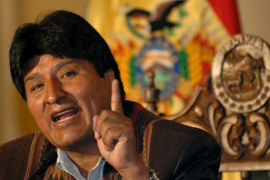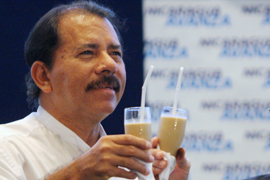Left foot forward
Analysis of some of the leading left-wing politicians in Latin America.

Rafael Correa looks set to become Ecuador’s new president and head of the latest left-leaning government in Latin America. Al Jazeera looks at the region’s most prominent left-wing politicians.
 |
|
Correa looks set to become Ecuador’s eighth president in the last 10 years |
Rafael Correa (Ecuador)
Exit polls and early results showed the former economist, Correa, has a 13 per cent lead over his rival Alvaro Noboa in a presidential runoff vote on November 26.
Correa had led all the opinion polls going into the first round of voting, but surprisingly he ran out second in the vote on October 15 to Noboa, a banana magnate and the country’s richest man.
He subsequently cried foul and an allegation of voting irregularities is being investigated by authorities after the electoral vote-counting system broke down temporarily on the day of the ballot.
Correa has descibed himself as an ally of Hugo Chavez, the Venezuelan president, but says he is not as anti-American, even though he opposes a draft free trade agreement with the US and would close the American military base in the coastal town of Mantas.
He has promised a “citizens’ revolution” if elected whose priority would be bringing political stability to a country that has had seven different presidents in the last ten years.
 |
|
Evo and his friend Hugo are trying to give |
Evo Morales (Bolivia)
A former coca farmer, Morales caused concern in Washington with his anti-US rhetoric during campaigning for last year’s presidential election.
However, since being sworn in as president in January, he has toned the hostility down but has remained closely-allied to Hugo Chavez and Fidel Castro.
He has irked the US administration with his insistence on cultivating and selling coca leaves, a key ingredient in the production of cocaine.
He is Bolivia’s first indigenous president and has also made moves to re-nationalise Bolivia’s oil and gas industries so the country’s predominately poor population will be able to profit from its vast natural resources.
 |
|
Lopez Obrador was not the most gracious loser and claims he is the “legitimate president” |
Andres Manuel Lopez Obrador (Mexico)
The saga that was the aftermath of Mexico’s presidential election in July highlighted the stark social divisions between the country’s upper and middle classes and the underpriviliged majority.
The closest vote in Mexican history was finally settled by judges in favour of the centre-right candidate, Felipe Calderon, on September 5 after claims of electoral fraud by Lopez Obrador and his followers who brought Mexico City to a standstill with mass protests.
Calderon will be sworn in on December 1 but Lopez Obrador, popular with the country’s poor, has already declared he is the “legitimate president” and has pledged to run a “parallel government”.
He has unveiled his own “cabinet” that will aim to pressurise the new government.
 |
|
Daniel Ortega is a familiar |
Daniel Ortega (Nicaragua)
Ortega was re-elected president of Nicaragua in November, 16 years after he last held the post, after he defeated Washington-backed Eduardo Montealegre.
Ortega is a former Marxist and was head of the Sandinistas party that fought the US-backed Contras in a war in the 1980s that killed between 30,000 and 60,000 Nicaraguans.
After securing a second presidency at the fourth attempt of trying there are assumptions Ortega will join regional leaders such as Hugo Chavez and Fidel Castro in an anti-US bloc.
Chavez championed Ortega’s presidential campaign and supplied discount oil to Nicaragua’s poor.
However, Ortega says he has abandoned his Marxist past and has remodelled himself as a devout catholic, meaning he may be less radical than both the US and Chavez expect.
 |
|
Humala (R) displays his left-wing credentials to the writer Noam Chomsky |
Ollanta Humala (Peru)
Humala won the first round of voting in the presidential election in April, but subsequently lost out to the centre-left former president Alan Garcia in a run-off.
A former military commander, once part of a coup attempt, the nationalistic Humala is popular with Peru’s poor and was the favoured choice of Hugo Chavez – who was accused of meddling in the election by Garcia.
Since his defeat, however, Humala has been forced to deny a series of accusations relating to human rights abuses when he was in the army, receiving funds from Chavez during the election and having links to the disgraced former president, Alberto Fujimori.
 |
|
Michelle Bachelet has been busy |
Michelle Bachelet (Chile)
The election of Michelle Bachelet as president of one of South America’s traditionally-conservative societies is seen by many of the profound political and social change currently taking place in Chile.
Bachelet was Chile’s first female cabinet minister and has appointed a cabinet containing an equal number of men and women since being sworn in as the first female president in March.
Politically, Bachelet favours the liberalism that has seen Chile’s economy become the strongest in South America, rather than the more nationalist measures favoured by Chavez and Morales.
She recently hosted an international gathering of socialist leaders in Santiago where she espoused the virtues of globalisation.
 |
|
Lula bounced back from corruption |
Luiz Inacio Lula da Silva (Brazil)
The former union leader became the first member of Brazil’s large working class population to be elected president in 2002 and has won adimiration for his social measures aimed at helping Brazil’s poorest citizens.
However, he has moved on from his radical political beginnings and his first-year term was characterised by a more modern social democratic outlook.
In the last couple of years he has had to cope with a cash-for-votes scandal within his workers’ party and was forced into a second round of voting before being re-elected in October.
It remains to be seen if Lula’s second term foreign policy will align him more with the anti-Washington axis being developed by Hugo Chavez. Washington currently sees Brazil as the more moderate side of Latin America’s move to the left.